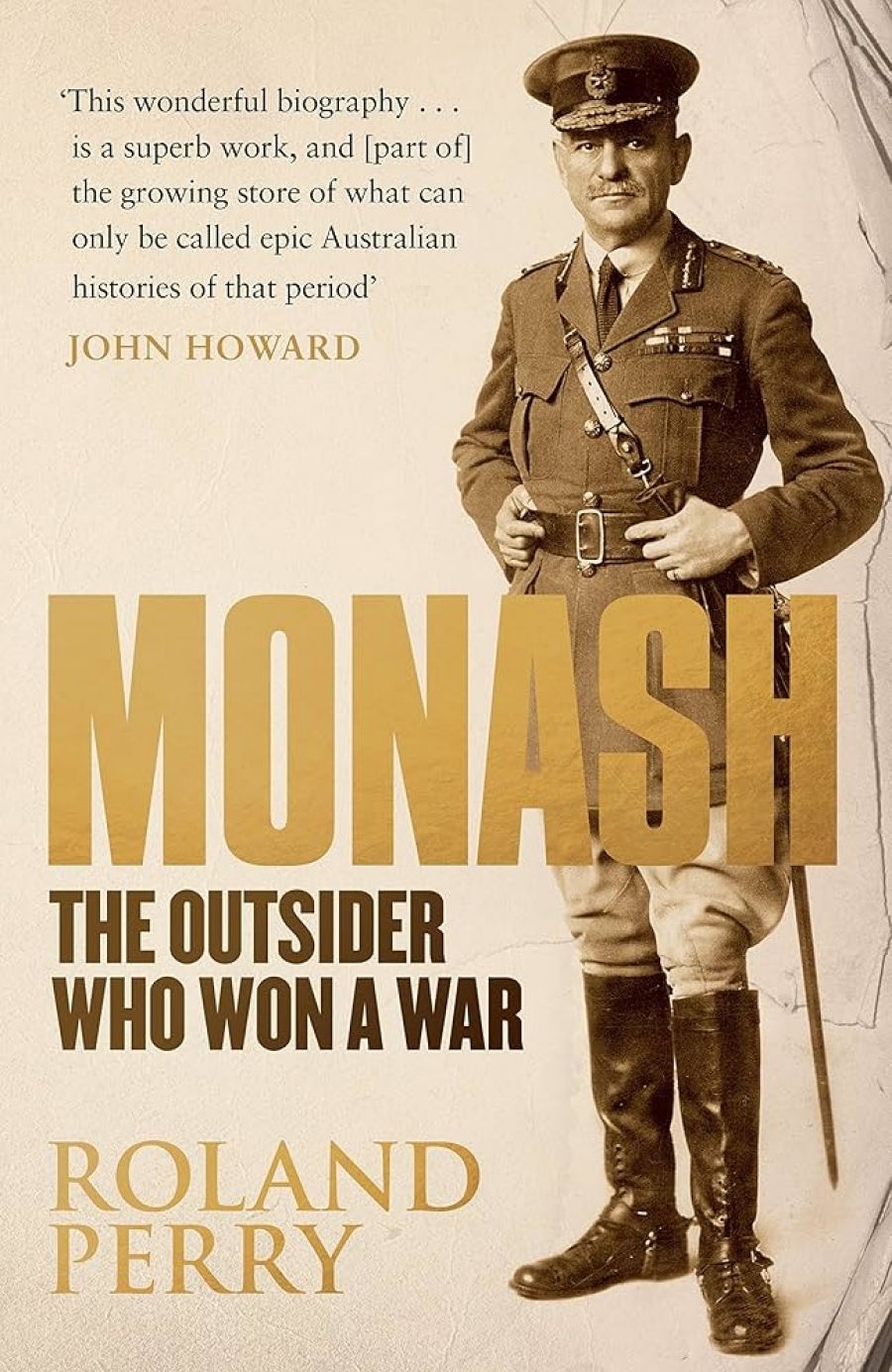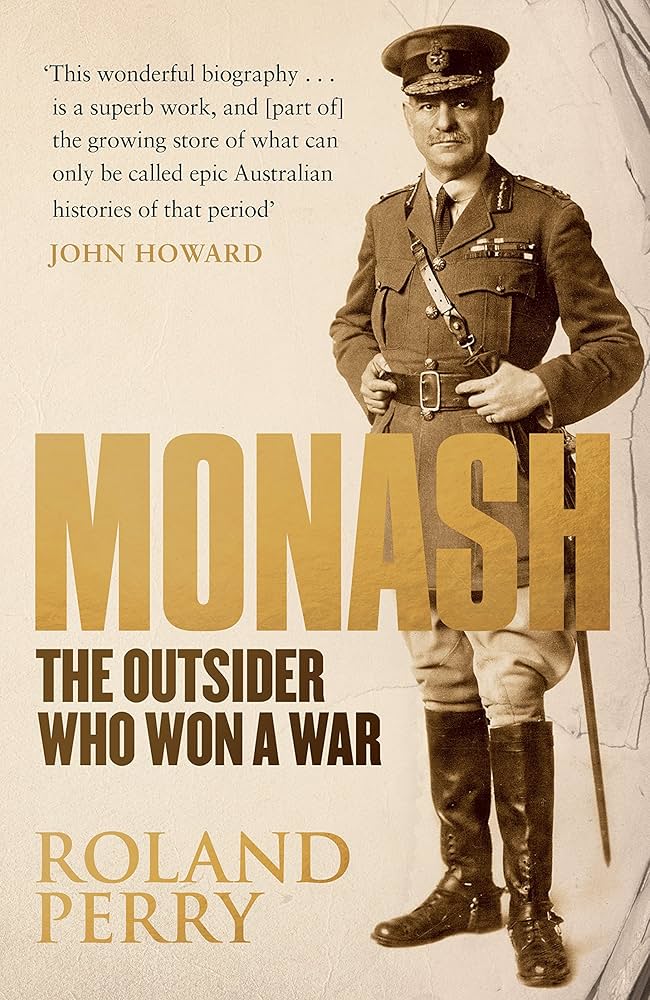
- Free Article: No
- Contents Category: Biography
- Review Article: Yes
- Article Title: A Great Australian
- Online Only: No
- Custom Highlight Text:
For a man who has as much claim as anyone to the title of ‘greatest Australian’, John Monash has remained a somewhat distant figure in the national imagination. Certainly, he is far less well known than that other pretender to the title, Donald Bradman. But the publication of a new biography by Roland Perry should put some balance back in Monash’s ledger.
- Book 1 Title: Monash
- Book 1 Subtitle: The Outsider Who Won A War
- Book 1 Biblio: Random House, $49.95 hb, 605 pp
- Book 1 Cover Small (400 x 600):

- Book 1 Cover (800 x 1200):

Born in Melbourne in 1865, John Monash was the son of German-Jewish immigrants. A brilliant school student, he worked hard to establish a successful engineering business. At the outbreak of the Great War, his long-term involvement in the citizen militia saw him appointed as colonel in command of the 4th Brigade of the Australian Imperial Force (AIF), in charge of some 4000 men. By the end of the war, Monash was Sir John and had risen to the rank of lieutenant-general in command of the entire Australian force in France, more than 160,000 men. He was, according to his supporters, the most successful general on the Allied side in the Great War.
Returning to Melbourne in 1919, Monash headed up the newly established State Electricity Commission. He resisted encouragement to enter politics, in particular from reactionary forces. When he died in 1931, his funeral was attended by an estimated crowd of 300,000 people.
Surprisingly perhaps, it took more than forty years after his death for the first substantial study of this enormously popular leader to appear, with the publication in 1973 of A.J. Smithers’s Sir John Monash. This book was largely superseded in 1982 by Geoffrey Serle's magisterial John Monash: A Biography, which benefited enormously from Monash's family providing access to his personal archives. Serle’s account was followed, three years later, by P.A. Pedersen’s detailed and balanced study, Monash as Military Commander.
Twenty years on and Australia's attitude to its military past has changed, with the nation much keener to celebrate its war history. Perry’s biography is right in step with this feeling. It is an enthusiastic account of Monash, subtitled The Outsider Who Won a War. No modesty here, nor in the description of the book as ‘a biography of Australia's greatest military commander’.
Perry repeatedly stresses that Monash’s considerable achievements are all the more remarkable because he succeeded in spite of distinct obstacles: his Jewishness, his German background, his lack of regular army experience, and so on. But if there is one criticism to make at the outset of Perry’s biography, it is that its author is too ready to regard Monash’s military career as uniformly positive, and to discount any criticism. The account of 1918, in particular, feels much like Monash’s own notoriously propagandising The Australian Victories in France in 1918 (1923), even down to salting the narrative with vignettes of Victoria Cross winners.
At the same time, Perry is probably right to denounce so forcibly the calumny of Major Cecil Allanson’s critique of Monash at Gallipoli, which has coloured many assessments of Monash ‘s brigade command. Likewise, Perry exposes the full extent of C.E.W. Bean’s antipathy to Monash. Bean was the Australian official war correspondent and historian, and it is to his lasting discredit that he never managed to put aside completely his aversion to Monash. Perhaps if Bean had been more enthusiastic in his correspondent’s reports, and used his influence and contacts after the war, Monash might have received more official recognition from the Australian government. Perry argues that Prime Minister Billy Hughes withheld from Monash his rightful dues because he was jealous of the general’s popularity and suspicious of what political aspirations the successful military leader might have in Australia.
Perry is in his element here, discussing reputations and intrigues. He loves character study: Machiavellians such as Keith Murdoch, and royalty such as George V. Perry is convinced that Monash's rise through the ranks of the AIF had a great deal to do with royal patronage, both directly through the king's very public interest in Monash, and indirectly through Sir Douglas Haig supporting someone he understood to be a royal favourite. It is a fascinating argument, even if the hard evidence remains largely anecdotal.
Given the status of Serle’s work, some comparisons are due, especially as the two books are so different. In the preface to the 2002 edition, John Rickard describes Serle’s biography as ‘a masterly balance between biographical intimacy and historical perspective’. Perry is less concerned with historical and social interplay, and much more interested in the ‘biographical intimacy’.
In particular, Perry brings into sharper focus the influence of Monash ‘s lover Lizzie Bentwich, both during and after the war. There is also a lot more detail about Monash's relationship with Anna Gabriel, the wife of an early business associate, with whom Monash carried on a long affair and almost eloped. Serie knew all about these liaisons but tended to underplay their details and significance.
Perry distils his story to its essentials, highlighting key relationships. This has its benefits, but there are times one misses the historian's measured analysis and detailed criticism. For example, Perry uses England, the United Kingdom and the British Empire as if they are interchangeable. His journalistic turns of phrase occasionally get away from him, such as comparing King George's discretion regarding knighthoods to the whim of a frequent-flyer manager handing out upgrades. Many sentences have escaped the copy editor’s attention.
Monash was certainly due for some more attention, and Perry has trodden new ground in this biography. It is to be hoped that his readers will retrace some old paths through Serle’s work as well.


Comments powered by CComment